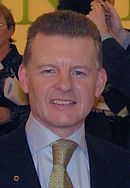
Learning from master judge John Donoghue about producing top quality honey for sale at the Banner Beekeepers’ Conference, Sun. 3 Feb.
*International Assessment of Agicultural Knowledge, Science and Technology for Development.
In the last week, the Banner Beekeepers have held their Annual Conference in Ennistymon, Co. Clare, and the Irish Organic Farmers & Growers Association (IOFGA) have held their AGM in Birr, Co. Offaly. As a novice beekeeper, I found the apiculture lectures very useful. Ethel Irvine from Co. Fermanagh spoke about the vital role of the drone which can smell a queen bee at 50 metres and see her with the 8000 lens in each eye. Natura in minimis maxime miranda (Nature is at its most awesome in miniature form). Keith Pierce spoke about breeding good queen bees. Dara Scott recommended ways to tackle the bee disease ‘nosema’ and Eoghan Mac Giolla Códa compared the strengths of the native Irish Dark Bee with Italian and other non-native bee varieties. John Donoghue as an expert judge at Honey Shows shared the criteria he uses to select the very best honey displays, (see photograph).
The IOFGA AGM was packed with farmers from all parts of Ireland. Gillian Westbrook, the IOFGA Manager set the scene with an overview of the CAP reform talks and some stark facts. 80% of organic food bought in Ireland is imported. Much of that could be grown here. Much of those imports are fruit and vegetables. Yet only a miniscule 1.3% of organic production in Ireland is vegetables and herbs. God bless the likes of organic growers like Philip Dreaper in Offaly, Jason Horner in Clare, my near neighbour, Jenny Mc Nally near Balbriggan and Paddy Byrne down the road near Skerries, but Ireland needs more organic growers as food imports waste diminishing oil resources. Check out www.organicgrowersireland.org and drop along to their gathering in the County Arms Hotel, Birr, Co. Offaly, on Wednesday 20th February next.
Organic farmer Stephen Briggs from England made a fascinating presentation about agroforestry, ie. combining growing of trees with cultivating poultry, pigs, wheat or maize etc between these N – S lines of nut trees, cherry trees in France or poplar trees in Ontario, Canada. This is how more food and fuel can be obtainable from the same piece of land, rather than depending on the future claims of genetically modified monoculture. We had ‘green revolution’ monoculture in the 1960′s which increased oil consumption more than food production. Now a similar mindset is arguing for a ‘gene revolution’ in the belief that a GM form of monoculture is sustainable into the future.
Dr. Colin Sage from UCC, speaking at the IOFGA Conference, referred to the 2009 IAASTD World Bank report, ‘Agriculture at a Crossroads’. This report had 580 authors, took 3 years to write and was endorsed by the WHO, FAO and 58 countries including Ireland. The key recommendations were that feeding a growing number of human beings worldwide requires an ‘agro-ecological approach’. Consumers aswell as farmers need to be urged to think and act in this more holistic way. Most of the world’s 525 million farmers produce food on less that 2 hectare holdings. Modern organic research and training can seriously boost their food production capacity. GM, says this authoritative report, has such a limited role that is represents a distraction to the really practical ways humanity must learn to feed itself. This is not Trevor Sargent talking, this is a global comprehensive World Bank initiated report ‘talking’!
Modern monoculture currently requires 10 calories of fossil fuels to deliver 1 calorie of food on a plate. Dr Colin Sage told his audience that there is a 95% correlation between the cost of energy and the cost of food at present. It is time for farmers to quickly get off the dependency on fossil fuels in food production. Because organic farming uses less fossil fuels than agrichemical farming, it is only a matter of time before organic food will cost less that the unaffordable chemically grown counterpart. However unless each able bodied person grows more food organically, all food grown after fossil fuel prices rocket, will cost a far higher percentage of disposable income than is the norm at present. Ipso facto, present Government policy will mean that future food riots are sadly inevitable, I believe. Read more about this IAASTD* World Bank report in my book ‘Trevor’s Kitchen Garden’, pp.35 – 36. (www.orpenpress.com). Whatever about the European Central Bank, Nature does not do negotiations!

Trevor is co-founder and was, until his appointment to Government, a board member of Sonairte, the Irish National Ecology Centre, near Julianstown, County Meath which is an Agricultural Training and Visitor centre with a 2.2 acre walled organic garden. He is also a member of Amnesty International, the Dublin Food Co-op, the Irish Organic Farmers’ and Growers’ Association, Organic Trust and a former member of Macra na Feirme. A former teacher and fluent Irish speaker, he relaxes by reading, walking and playing music. His favourite form of relaxation is tending to his prolific organic garden at home in Balbriggan, North County Dublin, an area known by many as Fingal.
Source: Trevor’s Kitchen Garden – Monoculture Cannot Feed the World After Peak Oil





